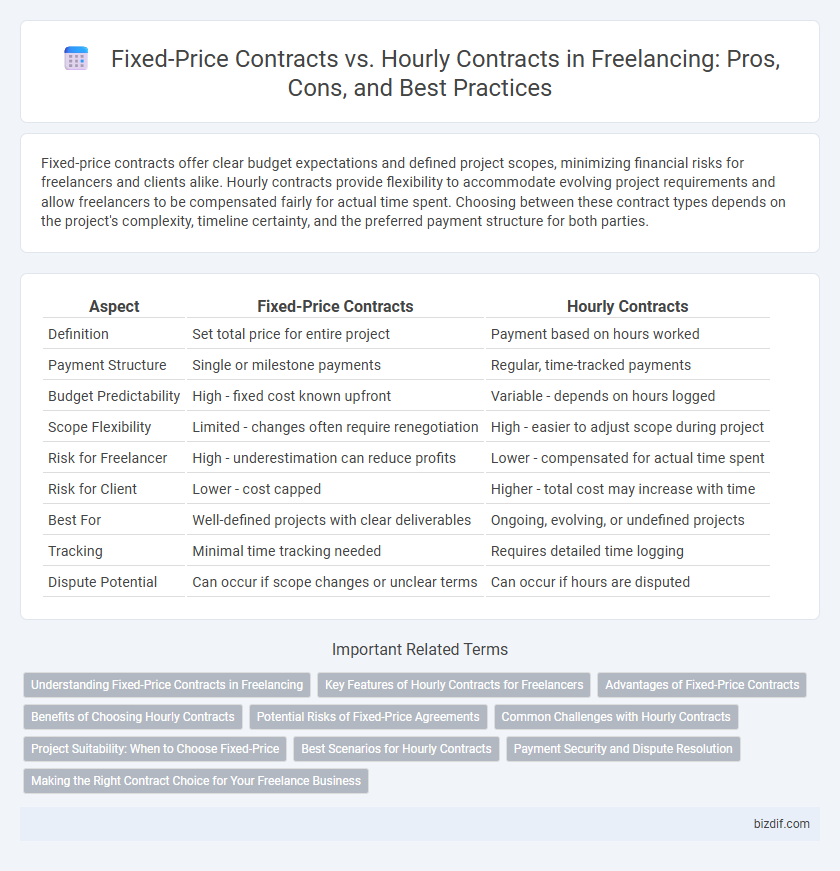Fixed-price contracts offer clear budget expectations and defined project scopes, minimizing financial risks for freelancers and clients alike. Hourly contracts provide flexibility to accommodate evolving project requirements and allow freelancers to be compensated fairly for actual time spent. Choosing between these contract types depends on the project's complexity, timeline certainty, and the preferred payment structure for both parties.
Table of Comparison
| Aspect | Fixed-Price Contracts | Hourly Contracts |
|---|---|---|
| Definition | Set total price for entire project | Payment based on hours worked |
| Payment Structure | Single or milestone payments | Regular, time-tracked payments |
| Budget Predictability | High - fixed cost known upfront | Variable - depends on hours logged |
| Scope Flexibility | Limited - changes often require renegotiation | High - easier to adjust scope during project |
| Risk for Freelancer | High - underestimation can reduce profits | Lower - compensated for actual time spent |
| Risk for Client | Lower - cost capped | Higher - total cost may increase with time |
| Best For | Well-defined projects with clear deliverables | Ongoing, evolving, or undefined projects |
| Tracking | Minimal time tracking needed | Requires detailed time logging |
| Dispute Potential | Can occur if scope changes or unclear terms | Can occur if hours are disputed |
Understanding Fixed-Price Contracts in Freelancing
Fixed-price contracts in freelancing involve agreeing on a specific sum for a project regardless of time taken, providing clear budget expectations for clients and defined payout for freelancers. These contracts reduce the risk of scope creep by setting deliverables and deadlines upfront, making project planning more precise. Freelancers benefit from fixed-price contracts by leveraging efficiency and expertise to maximize earnings within the agreed budget.
Key Features of Hourly Contracts for Freelancers
Hourly contracts for freelancers provide payment based on actual hours worked, tracked through time-logging tools that ensure transparency and accuracy. These contracts offer flexibility to accommodate evolving project scopes and allow freelancers to bill for overtime or additional tasks. Clients benefit from ongoing updates and clear documentation of work progress, fostering trust and clear communication throughout the engagement.
Advantages of Fixed-Price Contracts
Fixed-price contracts provide clear budget expectations by specifying a set payment amount, reducing financial uncertainty for clients and freelancers. They motivate timely project completion and efficient resource management, as payments are not tied to hours worked but deliverables achieved. Fixed-price agreements also simplify project tracking and minimize disputes over scope or hours, fostering a more transparent freelancer-client relationship.
Benefits of Choosing Hourly Contracts
Hourly contracts offer flexibility by allowing freelancers to get paid for every actual hour worked, ensuring fair compensation for unpredictable project scopes. Transparent tracking tools and detailed timesheets enhance accountability and build trust between clients and freelancers. This payment model incentivizes high-quality work and real-time communication, optimizing project outcomes and client satisfaction.
Potential Risks of Fixed-Price Agreements
Fixed-price contracts carry the risk of scope creep, where unanticipated project changes can lead to disputes or loss of profit for freelancers. These agreements may pressure freelancers to underestimate the time required, resulting in rushed work or diminished quality. Clients might also expect unlimited revisions within the fixed budget, increasing workload without additional compensation.
Common Challenges with Hourly Contracts
Hourly contracts in freelancing often face challenges such as accurately tracking billable hours and disputes over time logs, which can lead to payment delays. Freelancers may struggle with inconsistent workloads, making income unpredictable and complicating project budgeting. Clients sometimes question the necessity of logged hours, resulting in trust issues and strained communication.
Project Suitability: When to Choose Fixed-Price
Fixed-price contracts are ideal for projects with clear, well-defined scopes and deliverables, ensuring predictable budgets and timelines. They work best when the client and freelancer agree on specific milestones and outcomes upfront, minimizing the risk of scope creep. Suitable for smaller or straightforward projects, these contracts help maintain control over costs and project progress.
Best Scenarios for Hourly Contracts
Hourly contracts are ideal for projects with evolving requirements or unclear scopes, allowing flexibility in time and budget adjustments. They benefit ongoing collaborations where continuous input and iterative feedback are necessary to refine deliverables. Freelancers also prefer hourly contracts when tasks require variable effort or unpredictable challenges, ensuring fair compensation for actual work performed.
Payment Security and Dispute Resolution
Fixed-price contracts provide clear payment terms and milestones that may enhance payment security by ensuring funds are released only after agreed deliverables, reducing risks of underpayment. Hourly contracts track actual time worked, offering transparency but may require detailed records and increase dispute potential if hours are contested. Dispute resolution in fixed-price agreements often centers on project scope clarity, while hourly contracts depend on accurate time tracking and communication to resolve payment conflicts efficiently.
Making the Right Contract Choice for Your Freelance Business
Choosing between fixed-price contracts and hourly contracts depends on project scope, budget predictability, and client preferences. Fixed-price contracts offer clear deliverables and budget control, ideal for well-defined projects, while hourly contracts provide flexibility for ongoing or evolving tasks, ensuring fair compensation for variable workloads. Evaluating project complexity, time estimates, and risk tolerance helps freelancers make informed contract decisions to optimize income and client satisfaction.
Fixed-price contracts vs Hourly contracts Infographic

 bizdif.com
bizdif.com